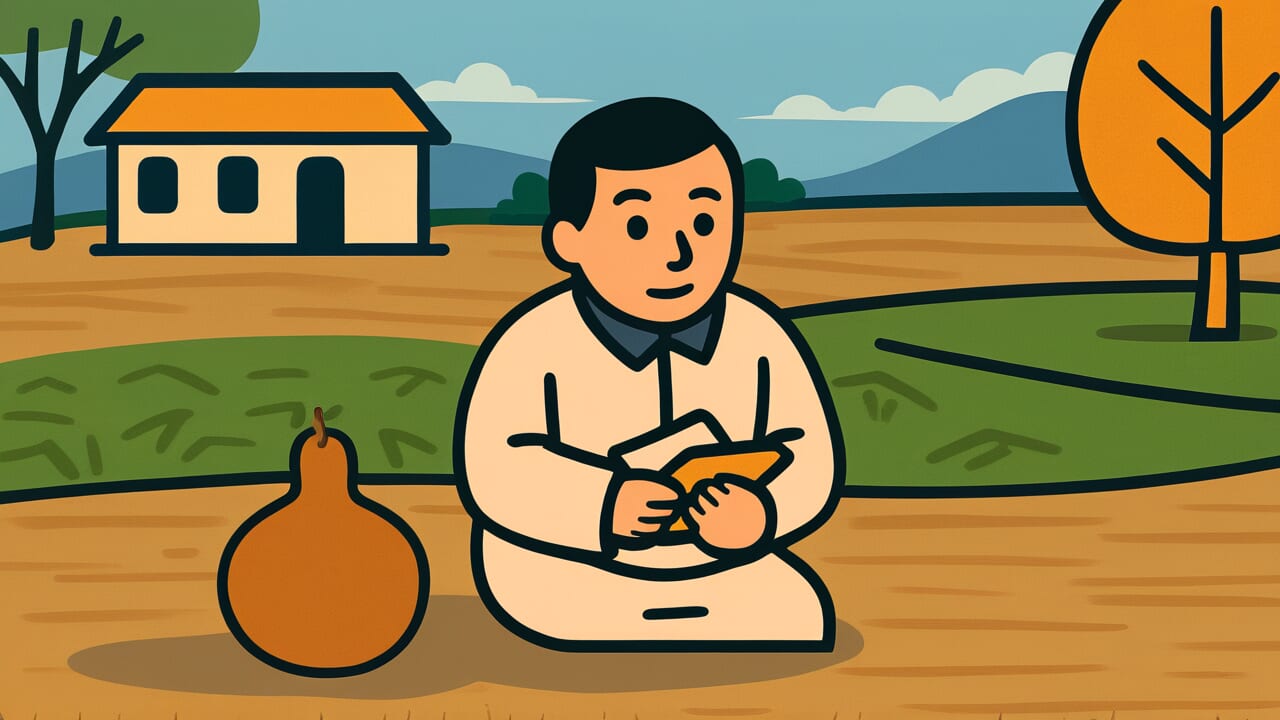How to Read “Konnyaku and scholars are better from the countryside”
Konnyaku to gakusha wa inaka ga yoi
Meaning of “Konnyaku and scholars are better from the countryside”
This proverb means that both konnyaku and scholars are of higher quality when they come from the countryside rather than the city.
For konnyaku, the countryside produces fresher products made with traditional, careful methods. These are superior to mass-produced versions sold in cities.
For scholars, the meaning goes deeper. Scholars who work in the countryside, away from urban fame and power struggles, can focus purely on their research. They produce more essential and valuable work.
This proverb teaches us to value substance over appearance. It tells us to look beyond flashy exteriors and convenience to find true quality and essential worth.
The saying shows that real value grows best away from urban noise and competition. Even today, people use it when praising substance and sincere effort over superficial reputation and titles.
Origin and Etymology
No clear written record shows exactly when or where this proverb first appeared. However, based on its structure, it likely emerged during the Edo or Meiji period.
Konnyaku is made from konjac yam and has been essential in Japanese cuisine for centuries. Countryside konnyaku was considered superior because it used fresh yams and traditional methods.
Urban konnyaku often lost quality during distribution and mass production. Time and commercial processes degraded the final product.
The scholar comparison has an interesting background. From the Edo through Meiji periods, urban scholars often got caught up in factional disputes and chasing fame.
They sometimes drifted into empty theories disconnected from practical learning. Rural scholars, by contrast, could focus purely on their studies away from worldly distractions.
Countryside scholars also had the advantage of staying connected to real people’s lives. This grounded their academic work in practical reality.
By pairing konnyaku with scholars, the proverb expresses a value system. It honors rural substance over urban glamour.
Interesting Facts
Konnyaku is called “intestinal sand scrubber” in Japanese. People have long valued it as a health food that helps remove waste from the body.
In rural areas, many families made their own konnyaku at home. Each household had its own unique taste and texture. The traditional method, from harvesting konjac yams to production, was entirely done by hand.
Some regions still preserve these traditional techniques today.
In the academic world, many great discoveries and research breakthroughs actually happened in quiet environments away from urban bustle.
Modern researchers acknowledge that focused environments and insights from daily observation lead to excellent research results.
Usage Examples
- That university professor quit his famous city university to move to a rural research institute. “Konnyaku and scholars are better from the countryside,” so he’ll probably produce wonderful research results.
- I was amazed by the delicious handmade konnyaku I bought at the roadside station. “Konnyaku and scholars are better from the countryside” is really true.
Universal Wisdom
This proverb has been passed down because it touches on a universal theme. It contrasts essence with surface in human society.
Cities constantly pursue novelty, convenience, and glamour. But in that competition and noise, don’t we sometimes lose sight of what truly matters?
This proverb pairs a humble food with an intellectual profession. It contains deep human understanding. Both reveal their true value when nurtured slowly and carefully over time.
Konnyaku needs fresh ingredients and traditional methods. Scholars need quiet environments and pure curiosity. Neither can be rushed or mass-produced.
Humans seek speed and efficiency, yet we instinctively understand the value of things that mature slowly.
We enjoy urban convenience, yet feel drawn to rural simplicity. This happens because deep in our hearts, we retain the ability to recognize authenticity.
This proverb teaches us to see through appearances and reputation to find substance. That wisdom remains essential for humans across all eras.
When AI Hears This
Information theory proves mathematically that when desired signals get buried in noise, correct information cannot be extracted. Imagine radio static.
You want to hear music, but too much electromagnetic noise makes everything inaudible. This proverb expresses exactly this principle through konnyaku and scholars.
Looking at konnyaku growth as information processing, absorbing nutrients from soil equals “receiving necessary chemical signals.”
Urban soil contains many “noise components” like factory wastewater and traffic-derived chemicals. Konnyaku roots struggle to filter out “pure signals” like nitrogen and potassium they actually need.
Clean rural soil has a high signal-to-noise ratio. Konnyaku can grow efficiently there.
Scholarly thinking has the same structure. Deep contemplation requires long periods of concentration. But cities constantly inject “social noise” through relationships, meetings, and miscellaneous information.
Cognitive science research shows human working memory can process only limited information at once. More noise means less capacity for essential thinking.
In low-noise rural environments, the brain can concentrate its channel capacity entirely on pure contemplation and signal processing.
This proverb empirically grasped the core of information engineering. Quality depends on “how well you eliminate noise.”
Lessons for Today
This proverb teaches modern people to develop eyes that see the essence of value. Today’s society judges things by superficial metrics.
Brand names, titles, and social media follower counts often guide our decisions. But truly high-quality things don’t always exist in glamorous places.
When you choose something, are you swayed by flashy advertising or famous names? For food, check the origin and production method.
When evaluating people, look at actual work quality, not titles. This attitude cultivates your ability to recognize authenticity.
This proverb also offers insights about your own growth. Don’t let yourself be tossed around by others’ evaluations or competition.
Value environments where you can focus on polishing your essence. This doesn’t have to mean physical countryside.
Hold a quiet place in your heart. Make time to face what truly matters. This leads to your genuine growth.
Why not choose a life that seeks substantial fulfillment over superficial success?



Comments